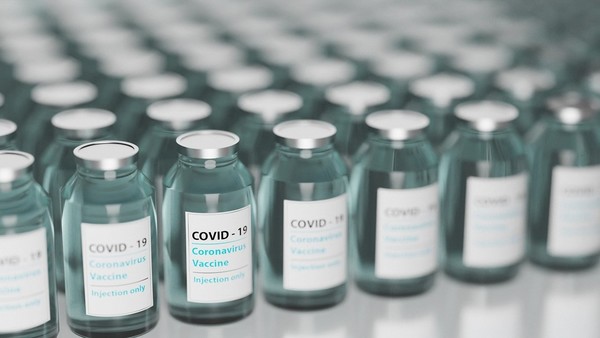The U.S. government’s massive support for Covid-19 vaccine development helped the country overcome the pandemic crisis. With the growing importance of vaccines in a public health crisis, Korea should secure mRNA vaccine technology as soon as possible, a report said.
The Korea Health Industry Development Institute (KHIDI) said in the report published on Monday that the U.S. could make up for its initial Covid-19 response failure by rolling out vaccines quickly and prevented a further spread of the infection.
As of Sunday, the accumulated number of Covid-19 cases reached 33 million, and Covid-19-related deaths surpassed 600,000 in the U.S. In other words, one in 10 Americans was infected with the virus. The number of daily cases once exceeded 300,000 but has gradually come down since early January to less than 10,000.
The U.S. began the vaccination with the FDA’s approval for Pfizer’s vaccine for emergency use on Dec. 18. As of Sunday, 46.6 percent of the U.S. population has been fully vaccinated. The country has the largest accumulated number of doses at 323 million in the world.

“Quarantine measures are not enough to end the Covid-19 pandemic,” the KHIDI said. “To cope with the second and third pandemic that may occur in the future, it is crucial to develop and secure a vaccine as soon as possible, along with strict quarantine measures.”
The U.S. could successfully develop Covid-19 vaccines because of the government’s full support for vaccine development under Operation Warp Speed (OWS), a public-private partnership, the strong infrastructure in basic science and pharmaceutical industries, and research culture encouraging new attempts, the KHIDI said.
Under the OWS established in May, the U.S. government spent $10 billion on developing Covid-19 vaccines. In the U.S., seven companies, including Pfizer-BioNTech, Moderna, and Johnson & Johnson (Janssen), received direct or indirect support from the government. Johnson & Johnson got $1 billion support, and Moderna, $1.5 billion. Pfizer signed a $200 million pre-purchase deal.
The FDA took the initiative to recruit participants for vaccine clinical trials. The clinical trial period, which normally takes about four years, was shortened to six months. U.S. drugmakers planned production, transportation, and distribution of vaccines from the vaccine development stage, which also played a key role, the KHIDI said.
the U.S. government secured the right to purchase vaccines first from companies supported by the OWS, the government could meet the two goals – developing Covid-19 vaccines and securing them – in just eight months.
The successful vaccine development in the U.S. was based on the large-scale biopharma cluster in Cambridge and Boston and academic culture encouraging new attempts, the KHIDI said.
Korea may not be able to build such a large life sciences cluster in a short time, but licensing-in mRNA technology could provide a chance to secure Covid-19 vaccines for Korean people, it added.
If Samsung BioLogics, which will manufacture Moderna’s vaccines, gets a transfer of mRNA vaccine technology to develop vaccines, the nation could become an Asian vaccine hub, the KHIDI went on to say.
Korea’s aspiration to become a vaccine hub was in line with U.S. President Joe Biden’s attempt to restructure the global value chain (GVC) to keep China in check.
While China and India dominate most vaccine productions worldwide, Korea could become a strategically important country, the KHIDI said.
“The U.S. relied most of the drugs and raw materials on imports from China and India and experienced difficulties in the early stage of the pandemic,” the report said. “The Biden administration aims to restructure GVC to secure safe medicines and raw materials in case of an emergency like Covid-19 and enhance public health security in preparation for a conflict with China.”
If the Korean company gets mRNA vaccine technology transfer, it would empower the nation’s competitiveness in vaccine technology and develop and manufacture mRNA vaccines for other diseases and make Korea become an Asian vaccine hub.

